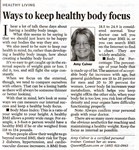 Ways to keep healthy body focus Ways to keep healthy body focus
I hear a lot of talk these days about having a healthy body image.
What this seems to be saying is that we should just learn to be happy with our bodies the way they are. And although it’s true that we need to stop comparing ourselves to the air-brushed borderline anorexics we see on the runways and in magazines, we also need to be sure to keep our health in mind.
So, rather than developing a healthy body image, how about creating a healthy body focus? And remember, being underweight is no better for your body than carrying excess weight.
It’s so easy to get caught up in the external aspects of weight gain or loss. I did it too, and still fight the urge constantly.
When we focus on the external, though, we tend to compare ourselves with others. That can be a losing battle as there will always be someone thinner or better looking.
With that in mind, let’s look at some ways we can measure our internal success and keep a healthy body focus.
When people allow their weight to go beyond normal BMI, their risk for Type 2 diabetes, hypertension, and cardiovascular disease increases. A BMI between 18.5 and 24.9 is considered normal. Your doctor can tell you what your BMI is, or you can search BMI on the internet to find a chart. They are widely available.
-
Body Fat Percentage: The percentage of your body that is made up of fat. The amount of acceptable body fat increases with age, but general guidelines are 15 to 25 percent for men and 20 to 30 percent for women. Lower body fat increases your metabolism, which helps you keep weight off and decreases your risk of weight-related health problems. On the other side, when your body fat is too low you risk loss of bone density and your organs have difficulty functioning properly.
Additional health measurements and their generally accepted desirable levels are:
Total Cholesterol:
LDL (bad) Cholesterol:
HDL (good) Cholesterol:
Triglycerides:
Blood Pressure:
|
|
Under 200 mg/dl
Under 100 mg/dl
Over 40 mg/dl in men - 50 mg/dl in women
Under 150 mg/dl
119/79 or below |
Note: Always confirm your personal goals with your doctor.
Your risk for heart attack or stroke is increased when any of these numbers fall out of the desirable range.
There are many more reasons beyond the obvious aesthetics for reaching and maintaining a healthy weight. Keep the focus as internal as possible. Eat right and exercise to feel better and live longer. Your body, as well as your friends and family, will thank you.
Until next time, stay healthy and be happy. |

